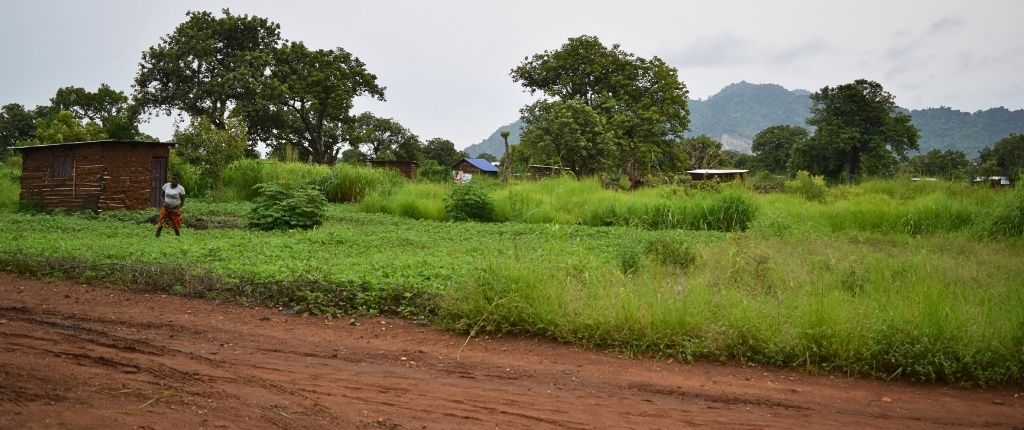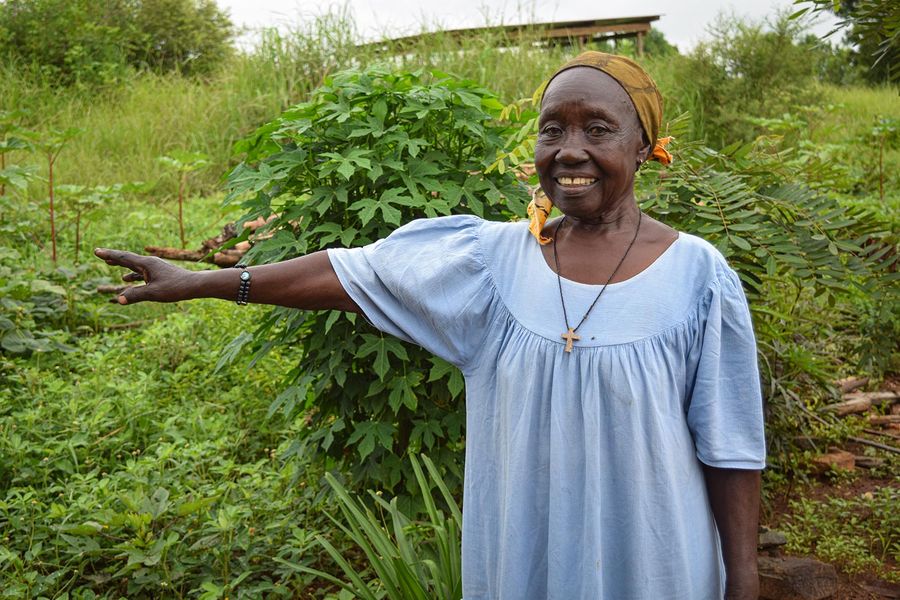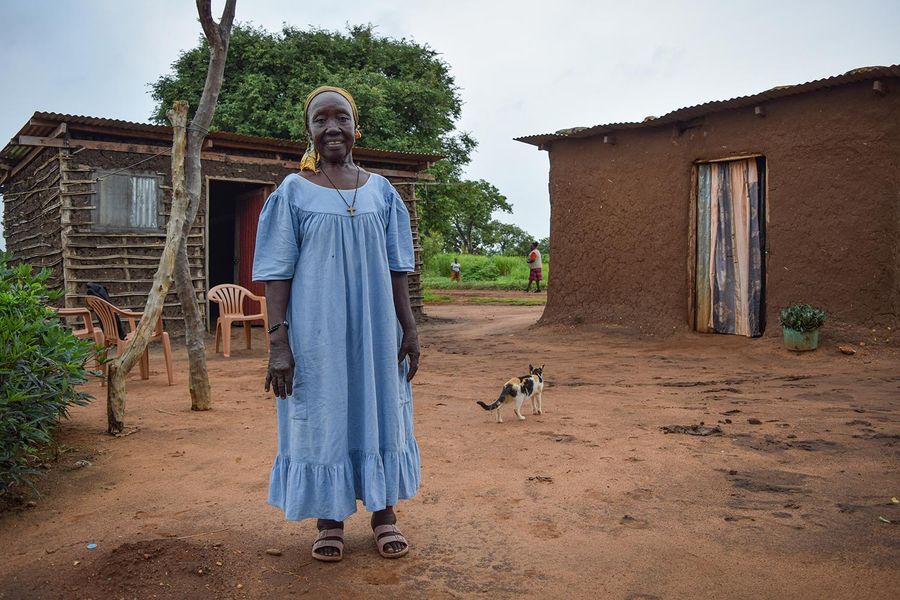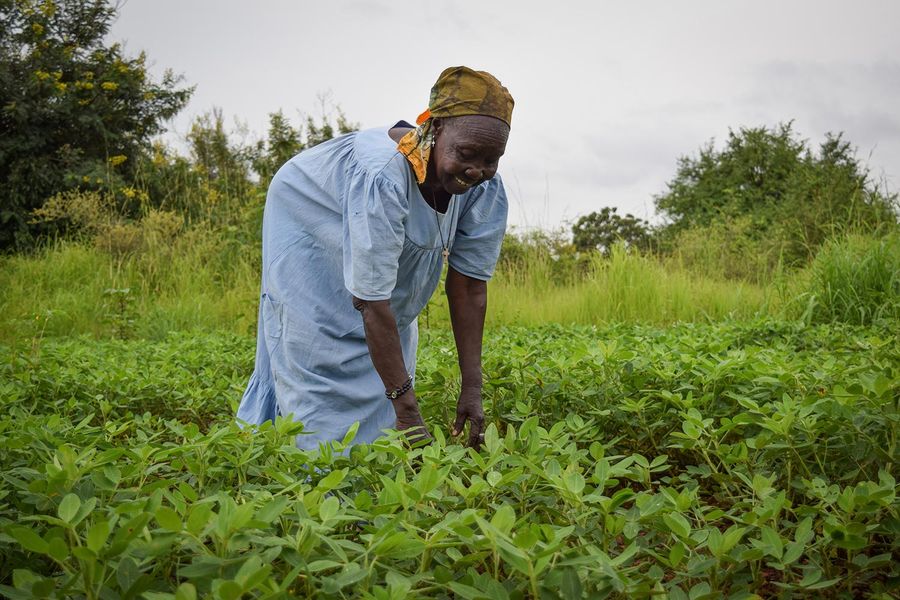
Janifar Yone Jambi: Resilience in the midst of crises

Fields of lush green young plants line the reddish-brown road that leads to Janifar Yone Jambi's house. The 66-year-old lives in Kabu South, a small community not far from the urban hustle of the South Sudanese capital, Juba. On this gray cloudy, not too hot day, she welcomes us - a small team from Malteser International - in a light blue dress and with a friendly smile. She takes us to her courtyard, where we sit down on plastic chairs to talk about her past and her life now. We want to understand how the complex crises of South Sudan shape Janifar's life and how she faces these challenges.
Displacement and loss
Like many people in South Sudan, Janifar no longer lives in the place where she was born. "I'm originally from Western Equatoria and moved here in the 1980s because of the civil war. I've lived near Juba ever since. It has become my home."
In addition to the experience of displacement, Janifar shares another fate with many South Sudanese: the painful loss of loved ones as a result of illness, war and conflict. "I gave birth to five children - two sons and three daughters. But only two of my daughters are still alive today." Her other children died early from illness. "Back then, there was hardly anything to eat and we had no money for medical care. We had to rely on local remedies, which unfortunately didn't always help." Janifar also lost her husband - he was shot many years ago.
Community and family: a strong network

Since her daughters have their own families, she lives alone in her house. But Janifar is closely connected to her community. "I’m going to church later. I read the Bible, pray and preach there. My activities in church have made me very well known here in the village. My community looks after me when I'm sick. My daughters and grandchildren visit me regularly."
Her neighbors also assist Janifar with the work on her field. She earns her living from farming and selling charcoal.
"Climate change has changed a lot of things " - Climate change and conflicts
But it's not just her community that supports her. "Malteser International is like a mother to us. Thanks to God." Malteser International has made it its mission to support and strengthen small-scale farmers around Juba in the face of the enormous challenges posed by climate change and ongoing conflicts.
"When we came here, life wasn't so bad. We had very good harvests and could use the money to buy salt, soap and even clothes. But in recent years, climate change has changed a lot of things. Now we cultivate our fields, but it can happen that it doesn't rain at all. That is demoralizing."
And then there is the conflict with the cattle herders: "There used to be none here. They came about two years ago." At that time, there was big flooding in other regions of the country, livestock drowned, and grazing land was destroyed. The pastoralists moved on to Central Equatoria in the south of the country, where Juba is located. "Last year we grew maize. One day we found all our land destroyed - the maize had been trampled down, as had the sorghum." This often leads to violent clashes between farmers and cattle herders. "I had encounters with them, which were very aggressive."
Facing challenges with strength

As part of our project supported by the German Federal Ministry for Economic Cooperation and Development, Janifar and over 100 other people in her community took part in a comprehensive program to help them face these challenges. "We received agricultural tools, seeds and fruit trees. The seeds consisted of things that most people here love: Groundnuts, cowpeas, sorghum, maize and okra," says Janifar. Janifar particularly enjoys the fruit trees, both because of the fruit and for another reason: "If I'm no longer alive one day, the trees will still be here."
In addition to the materials, Janifar and her community participated in trainings on sustainable agriculture adapted to climate change. "We have learned how to intercrop instead of monocropping. We used to grow a lot of different crops in one field, but now we know that it is more efficient to plant in rows and divide the fields.”
"My hope is that things will change and get better."
Janifar is hopeful about this year's harvest: "We have just started this year with the new methods. But even now, I can already see that the crops will do better than last year. I hope for the best results." Her wish for the future? "I pray that God will protect everyone from sickness so that next year everyone can concentrate on farming and be happy with what they have achieved. My hope is that things will change and get better."
At the end of our conversation, we walk to the fields we noticed on our way here. They belong to Janifar, whose tireless dedication and hard work have brought the young plants to life.
The interview was conducted in July 2024.








